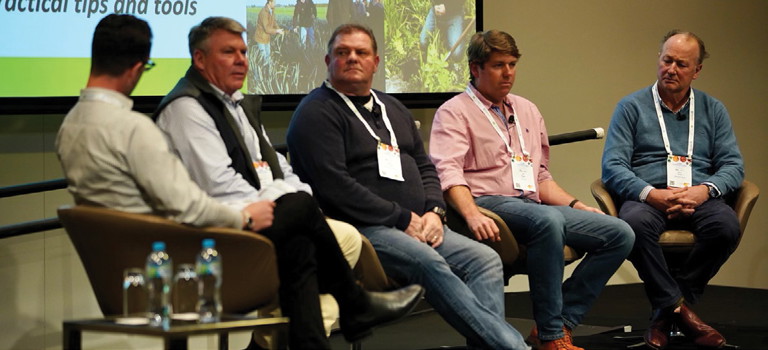
ANDREW Johanson (Mulgowie Farming Company), Adam Schreurs (Schreurs & Sons), Ed Fagan (Mulyan Farms), Mark Kable (Harvest Moon).
Demonstrating
innovations in
vegetable production
BY SOIL WEALTH ICP TEAM
The Soil Wealth and Integrated Crop Protection (ICP) project works with growers to put soil management and plant health research into practice.
This edition shares recent insights, learnings and innovations from the project’s demonstration sites around the country including New South Wales, Victoria, Tasmania, Queensland and the Northern Territory. Soil Wealth ICP Phase 2 (VG16078) is a strategic levy investment under the Hort Innovation Vegetable Fund.
Demo site growers share innovations at the Annual Vegetable Industry Seminar
The Annual Vegetable Industry Seminar, held ahead of Hort Connections 2022, attracted a room full of growers on 6 June in Brisbane.
Presentations included a grower panel from the Soil Wealth ICP project which discussed the cutting-edge practices and technologies that are key to improving productivity, profitability and sustainability in the Australian vegetable industry.
Team members Dr Gordon Rogers and Carl Larsen facilitated the discussion with growers who currently or previously hosted demonstration sites as part of the project. The growers shared why they became involved in Soil Wealth ICP, the areas of soil management and plant health that their demonstration sites focused on, as well as the benefits and lessons learnt, and what’s next for their soil and plant health journey.
Through their involvement in the project’s demonstration sites, all four growers questioned many traditional methods of farming and changed their production practices to increase productivity and profitability, while taking care of soil and plant health.
Mulyan Farms Director Ed Fagan is a third-generation vegetable grower near Cowra, New South Wales. Ed and his brother James have taken a whole farm approach to rebuilding their soils, employing carefully planned crop rotations, reduced tillage and cover crops to revitalise the soil and enhance their productivity.
Presentations included a grower panel from the Soil Wealth ICP project.
“Cover crops have made a world of difference and we’re putting in legumes to help manage the high cost of nitrogen fertilisers,” Ed said.
“Trash management is an ongoing challenge … but it’s amazing how healthy your soils can get by putting in cover crops.”
Schreurs & Sons Director Adam Schreurs has partnered with the Soil Wealth ICP team since 2014 to explore the use of cover crops and the application of precision agriculture in Koo Wee Rup, Victoria.
“We saw a lot of degradation over the years and when the demonstration sites came along, we thought it was a great opportunity to get involved,” he said.
While ryegrass and ryecorn cover crops were found to work well with leek crops, a change to an integrated pest management approach meant that Adam has transitioned from calendar spraying insecticides every week to first identifying pests and beneficials in a crop and only using targeted, softer products when needed throughout the growing season.
Harvest Moon Director Mark Kable has collaborated with the project for many years on controlled traffic farming, strip-till and cover crops in north-west Tasmania. He has also worked to share the lessons learnt to the broader industry.
“We’ve struggled with controlled traffic farming due to the typography of the area, but we worked with the ripper mulcher to help stop soil erosion and it’s still used today,” he said.
Mulgowie Farming Company in Queensland is one of the project’s newest demonstration sites. The business has a strong focus on innovation and sustainable farming practices, and their next goal is to better understand how to manage beneficial soil biology.
Specifically, Director Andrew Johanson is working with the Soil Wealth ICP team to improve mycorrhizal fungi in his soils.
“We introduced a soil health strategy and we were surprised to see
how quickly we turned the farms around,” he said.
“Given the different soils across
our farms, a slightly different management approach is needed in each area. Minimum till has led to more microbiology building up and the soil structure has changed, creating extra nutrients.”
For more information, see this video of the panel discussion.
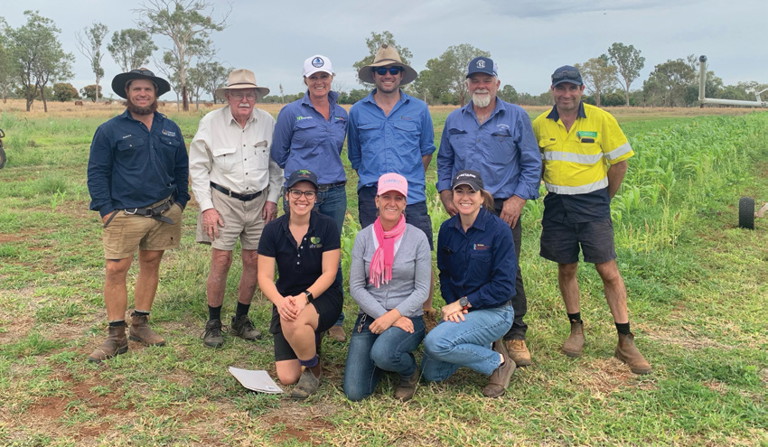
FIELD walk attendees with demonstration site grower Jeremy Trembath (pictured far left).
An inaugural field
walk was held during
June 2022.
Top End field walk showcases soil health improvements
Hosted by grower Jeremy Trembath, the Soil Wealth ICP demonstration site in Katherine, Northern Territory focuses on improving soil health and building soil resilience to weather events, particularly during the wet season, to prevent erosion and to protect soils.
To achieve this, Jeremy has used cover crops and reduced tillage in preparation for his sweet corn cash crop, and utilised an integrated approach to pest, disease and weed management.
An inaugural field walk in June 2022, supported by NT Farmers, aimed to share the learnings of the demonstration site so far and to better understand the challenges unique to vegetable growers in the Northern Territory.
Jeremy explained his approach to vegetable farming and attendees observed the demonstration area which has several small blocks of sweet corn planted at different times. The sweet corn is under sown with lucerne to protect the soil, with sabi and jarra grass planted between the blocks. Some areas of the paddock had bare soil before Jeremy had utilised the paddock.
In June 2021, Jeremy planted a mixed cover crop with:
• Legumes (sunn hemp, lablab, blue pea, cow pea, cavalcade all with rhizobial inoculants)
• Grasses (oats, millet, Rhodes grass)
• Broadleaf (sunflower)
• Biofumigant (jackhammer radish 2%).
The use of cover crops has produced a range of benefits including protecting the soil from erosion, retaining soil moisture and nutrients, and building organic matter, soil structure and soil biology levels.
Attendees witnessed the clear differences in root presence and improved soil structure for areas of the paddock where a cover crop was planted compared to areas of bare soil.
Additional discussions included the learnings associated with competition between cover crops and cash crops, the role of cover crops in disease management and the presence of beneficial mycorrhizal fungi in root samples taken at the site.
Jeremy also shared his approach of using minimum tillage and its benefits, as well as his management of fall armyworm which is supported by the biodiversity of beneficial insect species in the area.
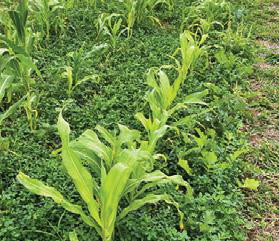
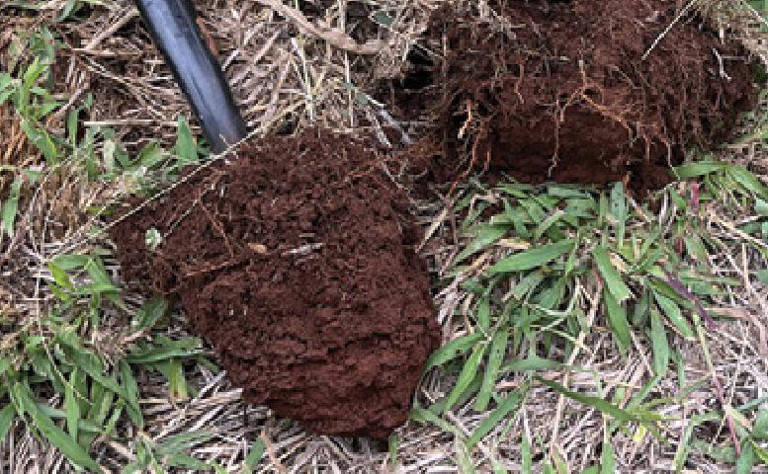
Sweet corn crop, under sown with lucerne; and a comparison of soils with no cover crops soils with sweet corn and lucerne .
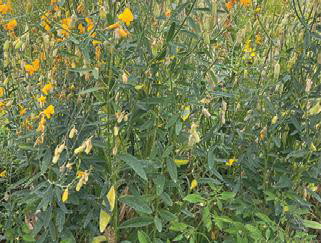
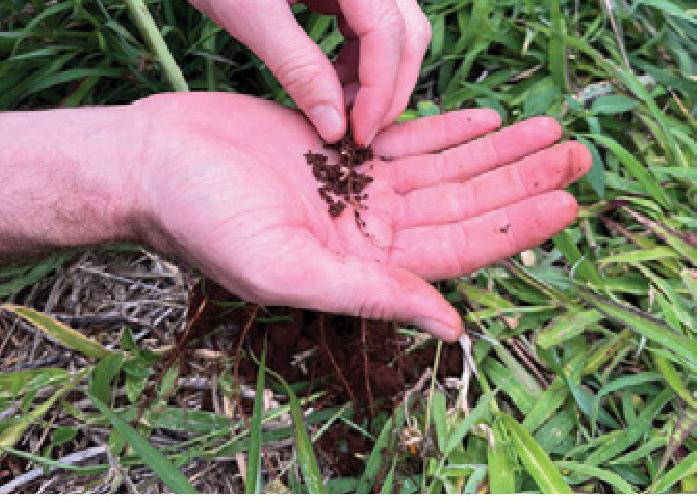
Sunn hemp cover crop nodules on sunn hemp roots.
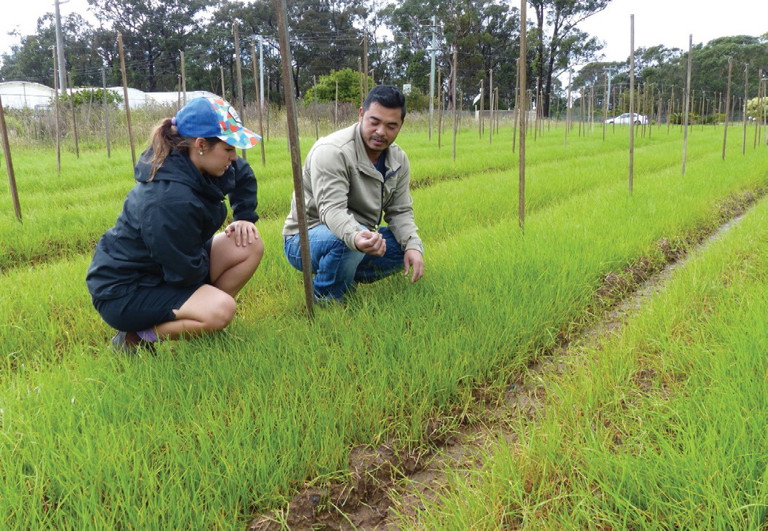
The ground cover has already played an important role in reducing erosion.
Soil Wealth ICP representative Stephanie Tabone and grower Kim Ngov inspecting beds with ryegrass cover crop on 13 April 2022.
Benefits of ryegrass ground cover at Sydney Basin demo site
At the Soil Wealth ICP Sydney Basin demonstration site in Wedderburn, grower Kim Ngov has transitioned from a successful inter-row ryegrass program to now growing high seeding rates of ryegrass as ground cover, in replacement of plastic mulch.
The Tetila ryegrass was hand sown over formed beds at >100kg/ha on 21 February 2022. Since sowing, the site has received over 660mm of rainfall. Kim has been happy to have the ground cover as it has already played an important role in reducing erosion and has eliminated the difficult task of laying plastic in wet conditions.
Kim is working with Soil Wealth ICP to trial different termination widths of the ryegrass prior to planting snow peas.
The termination of ryegrass with herbicide has been successful, leaving the site ready for planting when conditions are favourable.
The varying termination widths will be considered during the assessment of weed competition, crop vigour, yield and quality through winter and spring.
The Soil Wealth ICP team would like to thank its demonstration site growers for their involvement in the project and sharing their learnings with the wider industry.
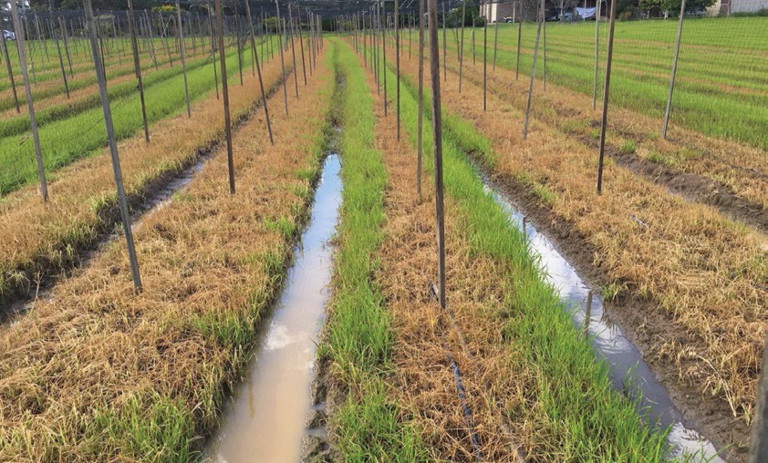
Successful ryegrass termination at varying widths in preparation for planting snow peas on 28 April 2022.
New resources on area wide management of insect-vectored viral and bacterial diseases
Area wide management (AWM) strategies for vector-borne diseases help to prevent or minimise the development of insecticide resistance in vector populations, improve the efficiency of biological agents released for control of vectors, and better protect host resistance genes against the emergence of resistancebreaking strains of the viruses. It also provides management options when host resistance genes are not available.
A new webinar recording is now available on the Soil Wealth ICP website which provides an overview of AWM for insect-vectored viral and bacterial diseases in vegetable crops.
You can also watch a series of three 30-minute webinars which focus on AWM strategies to control the following key viruses:
• Cucurbits: Cucumber green mottle mosaic virus (CGMMV) and zucchini yellows mosaic virus (ZYMV))
• Capsicums: Tomato spotted wilt virus (TSWV), pepper mild mottle virus (PMMoV) and insect transmission
• Lettuce: lettuce necrotic yellows virus (LNYV), lettuce mosaic virus (LMV), tomato spottled wilt virus (TSWV) and Big Vein.
A range of new fact sheets is available at soilwealth.com.au/resources/factsheets/pest-and-disease-management/ area-wide-management-of-vegetablediseases-resources/.
MORE INFORMATION
For more information, please contact project leaders Dr Gordon Rogers on (02) 8627 1040 gordon@ahr.com.au and Dr Anne-Maree Boland on (03) 9882 2670 or anne-mareeb@rmcg.com.au
Check out the new factsheets on the Soil Wealth website.